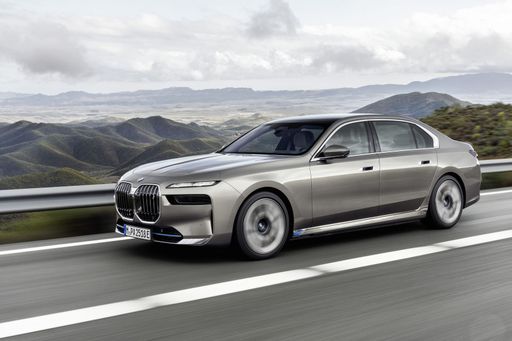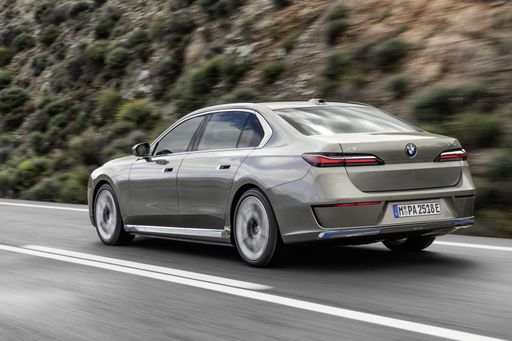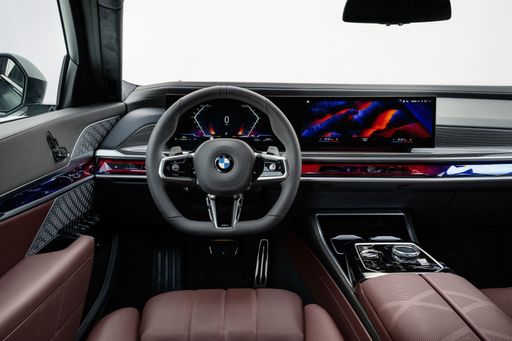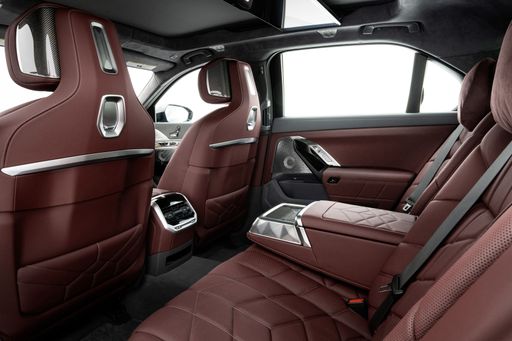BMW i7 VS Citroen Jumper – Specs, Efficiency & Price Comparison
Which model is the better choice – the BMW i7 or the Citroen Jumper? We compare performance (659 HP vs 279 HP), boot capacity (500 L vs ), efficiency (18.50 kWh vs 26.20 kWh7.50 L), and of course, the price (99200 £ vs 34200 £).
Find out now which car fits your needs better!
The BMW i7 (Sedan) is powered by a Electric engine and comes with a Automatic transmission. In comparison, the Citroen Jumper (Cargo Van) features a Electric or Diesel engine and a Automatic or Manuel gearbox.
When it comes to boot capacity, the BMW i7 offers 500 L, while the Citroen Jumper provides – depending on what matters most to you. If you’re looking for more power, you’ll need to decide whether the 659 HP of the BMW i7 or the 279 HP of the Citroen Jumper suits your needs better.
There are also differences in efficiency: 18.50 kWh vs 26.20 kWh7.50 L. In terms of price, the BMW i7 starts at 99200 £, while the Citroen Jumper is available from 34200 £.
Compare all the key specs now and find out which model fits your lifestyle best!
BMW i7
The new BMW i7 epitomises luxury and innovation, seamlessly blending advanced technology with elegant design. Its interior offers an unparalleled experience, with premium materials and cutting-edge features that create a tranquil yet engaging atmosphere for both driver and passengers. The i7's performance is both dynamic and efficient, demonstrating BMW's commitment to sustainable driving without compromising on the exhilarating drive the brand is known for.
details @ press.bmwgroup.com
@ press.bmwgroup.com
 @ press.bmwgroup.com
@ press.bmwgroup.com
 @ press.bmwgroup.com
@ press.bmwgroup.com
 @ press.bmwgroup.com
@ press.bmwgroup.com
Citroen Jumper
The Citroen Jumper impresses with its robust design and exceptional versatility, making it a popular choice for both business and leisure purposes. Its spacious interior is thoughtfully designed to maximise comfort and practicality, providing ample room for passengers and cargo alike. With a smooth driving experience and a range of advanced safety features, the Jumper is well-equipped to handle the demands of modern motoring.
details

|
|
|
|
|
Costs and Consumption |
|
|---|---|
|
Price
99200 - 157000 £
|
Price
34200 - 57800 £
|
|
Consumption L/100km
-
|
Consumption L/100km
7.5 - 9 L
|
|
Consumption kWh/100km
18.5 - 20.8 kWh
|
Consumption kWh/100km
26.20 kWh
|
|
Electric Range
559 - 624 km
|
Electric Range
424 km
|
|
Battery Capacity
101.70 kWh
|
Battery Capacity
97.80 kWh
|
|
co2
0 g/km
|
co2
0 - 233 g/km
|
|
Fuel tank capacity
-
|
Fuel tank capacity
90 L
|
Dimensions and Body |
|
|---|---|
|
Body Type
Sedan
|
Body Type
Cargo Van
|
|
Seats
5
|
Seats
3
|
|
Doors
4
|
Doors
4
|
|
Curb weight
2595 - 2770 kg
|
Curb weight
2075 - 2940 kg
|
|
Trunk capacity
500 L
|
Trunk capacity
-
|
|
Length
5391 mm
|
Length
5413 - 6363 mm
|
|
Width
1950 mm
|
Width
2050 mm
|
|
Height
1544 mm
|
Height
2254 - 2850 mm
|
|
Payload
480 - 535 kg
|
Payload
560 - 2020 kg
|
Engine and Performance |
|
|---|---|
|
Engine Type
Electric
|
Engine Type
Electric, Diesel
|
|
Transmission
Automatic
|
Transmission
Automatic, Manuel
|
|
Transmission Detail
-
|
Transmission Detail
Schaltgetriebe, Automatikgetriebe
|
|
Drive Type
Rear-Wheel Drive, All-Wheel Drive
|
Drive Type
Front-Wheel Drive
|
|
Power HP
455 - 659 HP
|
Power HP
120 - 279 HP
|
|
Acceleration 0-100km/h
3.7 - 5.5 s
|
Acceleration 0-100km/h
-
|
|
Max Speed
205 - 250 km/h
|
Max Speed
90 - 170 km/h
|
|
Torque
650 - 1100 Nm
|
Torque
320 - 450 Nm
|
|
Number of Cylinders
-
|
Number of Cylinders
4
|
|
Power kW
335 - 485 kW
|
Power kW
88 - 205 kW
|
|
Engine capacity
-
|
Engine capacity
2184 cm3
|
General |
|
|---|---|
|
Model Year
2022 - 2023
|
Model Year
2024
|
|
CO2 Efficiency Class
A
|
CO2 Efficiency Class
A, G
|
|
Brand
BMW
|
Brand
Citroen
|
BMW i7
The Pinnacle of Electric Luxury: BMW i7
Introducing the BMW i7, the latest in electric innovation from one of the world's premier automobile manufacturers. Blending cutting-edge technology with luxurious comfort, the i7 represents a significant leap forward in the electric vehicle (EV) market. This article delves into the technical specifications and innovative features that set the BMW i7 apart from its competitors.
Powerful Electric Performance
Under the sleek exterior of the BMW i7 lies a powerhouse of electric capabilities. Depending on the model configuration, the i7 offers between 455 and 660 PS, with a torque of up to 1100 Nm. This ensures an exhilarating driving experience, whether you choose the rear-wheel drive or all-wheel drive configuration. The acceleration is equally impressive, with the i7 capable of going from 0 to 100 km/h in just 3.7 to 5.5 seconds.
Efficient Energy Consumption
The efficiency of the BMW i7 is noteworthy, with an energy consumption ranging from 18.5 to 20.8 kWh/100 km. This efficiency, combined with a substantial battery capacity of 101.7 kWh, gives the i7 an electric range of between 559 and 623 kilometres. BMW’s commitment to sustainability is further underscored by its zero CO2 emissions, reinforcing its status as a premium yet environmentally conscious choice.
Sophisticated Interior and Technology
Inside, the BMW i7 is the epitome of luxury. With seating for five, the interior exudes elegance and comfort. Advanced technology is at your fingertips with features such as the latest iDrive system, providing seamless connectivity and enhanced control over vehicle functions. The i7 ensures you travel in style with its sophisticated Design Pure Excellence, M Sport package, and M Sport package Pro interior trims.
Dimensions and Capacity
The i7’s ample dimensions – with a length of 5391 mm, width of 1950 mm, and height of 1544 mm – are matched by its generous luggage capacity of 500 litres, ensuring practicality alongside luxury. The car's robust build is complemented by a payload capacity of between 480 to 535 kg, ensuring the i7 is as functional as it is stylish.
Cost and Efficiency
With prices ranging from €115,700 to €181,800, the i7 is positioned as a high-end vehicle offering value through its advanced features and performance. The monthly operating costs range between €2,143 and €3,027, while the cost per kilometre is approximately 85.7 to 121.1 cents. Despite its upscale market positioning, the i7 offers competitive efficiency with its remarkable CO2 emission-free driving and energy-saving technologies.
Conclusion
The BMW i7 stands as a testament to the brand’s innovation and dedication to sustainable luxury. By marrying performance, efficiency, and cutting-edge technology, BMW has ensured that the i7 not only meets but exceeds the expectations of discerning EV enthusiasts. The i7 is not merely a car; it is a statement of intent in the future of sustainable luxury. Experience the future today with the BMW i7.
Citroen Jumper
A Game-Changer in the Electric Van Market: The Citroën Jumper
The Citroën Jumper stands out in the realm of electric vans, bringing a blend of innovation, efficiency, and versatility to the table. This vehicle is designed to meet the needs of businesses searching for sustainable transport solutions, while also delivering impressive performance and technology.
Power Meets Performance: Technical Specifications
The Citroën Jumper is powered by an electric motor that provides an impressive 270 PS (200 kW) output. It operates with front-wheel drive and utilises an automatic transmission for smooth and efficient power delivery. The vehicle boasts a maximum torque of 410 Nm, ensuring it can handle various loads with ease.
A critical factor for business owners is operational cost, and the Jumper excels with a consumption rate of 26.2 kWh/100km and a driving range of 424 km on a full charge. This efficiency is complemented by a zero-emissions output, earning it a CO2 efficiency class of A.
Innovative Design and Features
Citroën has ingeniously optimised the Jumper's design for practicality and comfort. With a body style classified as a transporter, the vehicle is crafted for utility without sacrificing on essentials. It features a standard four-door configuration and offers seating for three, making it a practical choice for various industries.
The versatility in design is reflected in its various configurations, capable of accommodating different load requirements with a payload capacity ranging from 560 to 1385 kg. The Jumper's dimensions vary slightly with model choice, with lengths between 5998 mm and 6363 mm, width at 2050 mm, and height ranging from 2612 mm to 2850 mm.
Electric Innovation at its Core
At the core of the Citroën Jumper is its robust 97.8 kWh battery, making long journeys more feasible in the realm of electric vehicles. Notably, the vehicle maintains a lighter carbon footprint, contributing to sustainable transport solutions with its zero CO2 emissions.
Another innovation is the vehicle's capacity to reach top speeds between 90 km/h to 130 km/h, which shows that electric vans can maintain competitive performance metrics.
A Worthy Investment
While the Citroën Jumper signifies a higher initial investment, with prices ranging from €65,212 to €68,425, it promises considerable savings in fuel costs and environmental benefits over time. It presents an attractive proposition for businesses keen on contributing positively to the planet while maintaining operational efficiency.
In summary, the Citroën Jumper is a perfect embodiment of how electric vehicle technology can adapt to commercial needs, offering an efficient, innovative, and environmentally friendly transport solution.
The prices and data displayed are estimates based on German list prices and may vary by country. This information is not legally binding.
